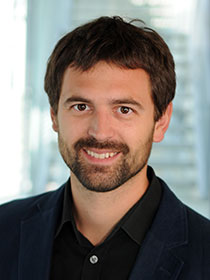Description
Permanent magnets are crucial components in sustainable technologies such as electric vehicles and wind turbines. However, the production of high-performance magnets currently relies heavily on rare earth elements, which could lead to a shortage due to the increasing demand for these materials. To address this issue, alternative magnets with significantly lower rare earth content are needed.
One promising solution is a two-phase magnet that incorporates both hard and soft magnetic regions. The goal of this project is to find the optimal spatial distribution for these regions to reduce rare earth content while maintaining high magnetic performance. The project will employ fast, massively parallel micromagnetic simulations and artificial intelligence techniques.
A framework will be developed to automatically prepare and perform a large number simulations for various hard/soft magnetic distributions. The results will be used as training data for a neural network called the Predictor. The Predictor will learn the influence of material composition and geometrical properties on the performance of the magnet. The trained network will then be used inversely as a Designer network to optimize the material composition and geometrical properties. In an active learning scheme the predicted designs will be validated by micromagnetic simulations and fed back into the neural network as training data.
Ultimately, the generative neural network for inverse design of high-performance, rare earth reduced permanent magnets will provide new guidelines for producing eco-friendly permanent magnets for sustainable technologies.
News
During the RICAM Special Semester on Computational Methods for Electric Machines, held at the Johann Radon Institute for Computational and Applied Mathematics from October to December 2025, Harald Özelt was invited to speak at Workshop 4: Magnetic Material Modelling (November 24 – 28, 2025). His talk titled “Graph-Based Machine Learning for Microstructural Design of Permanent Magnets” focused on the integration of reduced-order models and graph neural networks for materials design, and demonstrated how uncertainty estimates can be used to assess the trustworthiness of predictions. This interdisciplinary workshop brought together experts in micromagnetics, multiscale modeling, and materials science to advance computational approaches for magnetic materials.

The Magnetic Materials and Applications 2025 (MMA25) conference, organized by the UK Magnetics Society and held on 8 – 9 October 2025 in Kochel, Germany, provided a platform for bridging research and industry. Known for its strong emphasis on practical applications, MMA25 brought together experts from sectors such as automotive, energy, and manufacturing to discuss how advanced magnetic materials can meet real-world challenges. Harald Özelt was invited to give a talk on “Rare-Earth Lean Permanent Magnets: A Computational Design Approach”, demonstrating how simulation and machine learning can accelerate the development of sustainable magnet solutions for industrial needs.

Harald Özelt was invited to present his work at the 14th Joint European Magnetic Symposia (JEMS 2025), held in Frankfurt, Germany from 24–29 August 2025. In the symposium “Computational Magnetism and Machine Learning”, he delivered a talk titled “Combining Micromagnetics and Machine Learning for the Design of Rare-Earth Lean Permanent Magnets.” In his talk, Harald highlighted cutting-edge approaches that merge traditional micromagnetic simulations with modern machine learning techniques to accelerate the discovery and optimization of sustainable magnetic materials. He emphasized how computational design can reduce reliance on critical rare-earth elements while maintaining high-performance characteristics. Additionally, Harald served as chair for the Multiphysics and Multifunctional Materials poster session.

Harald Özelt was invited to speak at FisMat2025, held in Venice, Italy from 7 – 11 July 2025. In the special symposium “Advances on Permanent Magnets for Sustainable Solutions: Towards the European Green Deal”, he presented his talk on “Rare-Earth Lean Permanent Magnets Through Advanced Computational Design.” The symposium covered topics from the development of well-known rare-earth magnets to the design of novel rare-earth free materials with the potential to enable a partial substitution. The discussions spanned both experimental approaches and multi-level simulation perspectives.

Our new article titled “Physics aware machine learning for micromagnetic energy minimization: Recent algorithmic developments” was published in Computer Physics Communications in June 2025. In this work we explore machine learning methods, including Physics-Informed Noral Networks (PINNs) and Extreme Learning Machines (ELMs), for efficient Gibbs free energy minimization in micromagnetic simulations. By reformulating Brown’s magnetostatic energy bounds on finite domains and integrating hard constraints, the approach achieves accurate and scalable approximations of magnetostatic fields. The code for this work can be found at github.

From May 21st to 22nd 2025, Markus Gusenbauer, Alexander Kovacs, and Harald Özelt participated in the international workshop “Permanent Magnet Materials in the Making” at the Erich Schmid Institut (ESI) in Leoben, Austria. The event brought together researchers from Austria, Germany, Italy, Slovenia, and Spain to exchange insights on the latest developments in permanent magnet materials and explore future collaboration opportunities. In addition to project presentations and discussions, participants were also introduced to the card-based method as a tool for interdisciplinary engagement. Many thanks to the organizers, Andrea Bachmaier (WPI c/o ESI, ÖAW) and Erika Faigen (University of Vienna), for fostering such a productive and inspiring environment!

On April 7th 2025, our team participated in the international workshop “Data-driven Magnetic Materials Design and Optimization” in Vienna, hosted by the MaMMoS project and EMMC. The event brought together leading experts from academia and industry to explore advances in magnetic materials through data-driven approaches. We engaged in insightful discussions on multiscale simulation, data-sharing, and collaborative innovation. These exchanges sparked new ideas and valuable connections for our ongoing work.
The following day, we held a project meeting in Vienna with our partners from the Néel Institute, who had also attended the workshop.

A new article on Explainable machine learning and feature engineering applied to nanoindentation data was published on 29th March by our partners at the WPI. Using data from nanoindents in high-speed steels, the study trained and benchmarked machine learning models, demonstrating that feature engineering had a greater impact on prediction quality than model selection or hyperparameter tuning. The best classifier’s predictions were explained via a game theory-based approach, allowing insights into the model’s decision-making process and connecting the fields of materials property clustering and materials mechanics.

On January 17th, 2025, Sebastian Schaffer successfully defended his doctoral thesis at the Faculty of Mathematics and the MMM Research Platform, University of Vienna. His research focused on Physics-Informed Machine Learning in the field of micromagnetism, exploring advanced neural network methodologies and their applications. This thesis examines Physics-Informed Neural Networks (PINNs), Extreme Learning Machines (ELMs), and hard constrained PINNs. These methods aim to solve complex physical problems, such as the stray field problem, by embedding physical laws directly into the neural network training process. This approach enables efficient and accurate solutions without the need for extensive training data.

In October 2024, Harald Özelt participated in an intensive three-day workshop focused on enhancing project leadership skills in research and development. The workshop held by Judith Popela provided valuable insights into securing research funding, effectively motivating teams, and managing the complexities of project logistics. The sessions covered key funding programs and offered practical tools for researchers aiming to lead successful projects.

From September 15th to 18th 2024, the 21st International IGTE Symposium 2024 on Computational Methods in Electromagnetics and Multiphysics took place in Graz, Austria. Markus Gusenbauer participated in the Minisymposium on Micro-to Macroscopic Hysteresis Modeling and gave a presentation titled Machine Learning-Enhanced Modelling of Large Magnetic Systems. He demonstrated the feasibility of using machine learning to investigate experimentally measured material samples. By overcoming the length scale limitations of micromagnetic simulations, macroscopic hysteresis properties can be acquired in the sub-millimeter regime. Local coercivity is predicted using a pre-trained machine learning model. Combined with computed interaction fields and an analytically determined reversible part using the Stoner-Wohlfarth model, the macroscopic demagnetization curve can be calculated.

From August 27th to September 6th 2024, Heisam Moustafa attended the European School on Magnetism (ESM) in York, UK, which is organized annually by the European Magnetism Association (EMA). The theme of the summer school was Magnetism for Energy-Efficient Devices. During the two weeks, courses were offered on the fundamentals, techniques, functions, and applications in magnetism. Additionally, there were tutorials and a poster session where Heisam presented his work on graph neural networks for hard magnetic microstructures (poster).

Magnetic Art
Our submission for the MagneticArt competition during the International Conference on Magnetism (ICM) in Bologna was nominated into the finalists and exposed on-site at the entrance of the conference building.
The collage was assembled from over 200 images drawn mainly by kids visiting our "AI for Magnetism" booth at Researchers' Night in Austria. Using a USB camera and a machine learning model, visitors could draw their own magnet designs with felt-tip pens and instantly assess how strong the magnet would be if manufactured.
From June 30th to July 5th, 2024, the International Conference on Magnetism (ICM) took place in Bologna, Italy. We presented our work on Active Learning-assisted Optimization of Magnetic Nanostructures in a poster session (poster). We showed the structure of our generated training data, how we built the Convolutional Neural Network, and the capability to predict magnetic properties from the structural features of a two-phase magnet. The use of the the network as a surrogate model for optimization was explained and the best designs so far were discussed. The importance of the integrated active learning loop was emphasized. Interesting discussions spawned during the poster sessions which carried on into the bars of Bologna.

On June 26th, 2024, together with the MMM platform at WPI we held a Workshop on Maschine learning methods for computational micromagnetism and sustainable magnet design. Eight participants presented their current work and how they use machine learning to advance their research topic. Each presentation was followed by a discussion on the implementation and problems as well as potential improvements.

On 24. May 2024, the Lange Nacht der Forschung took place at various venues across Austria. Our research booth in Krems showcased how micromagnetic simulations and artificial intelligence can accelerate the discovery of eco-friendly, sustainable, and cost-effective permanent magnets (poster). Visitors actively participated in the research by drawing magnets with various phase distributions and crystal structures using felt-tip pens (poster). Our trained AI then analyzed their designs, predicting their potential performance. Through discussions, we emphasized the importance of magnet research for the green energy transition in the fight against climate change.
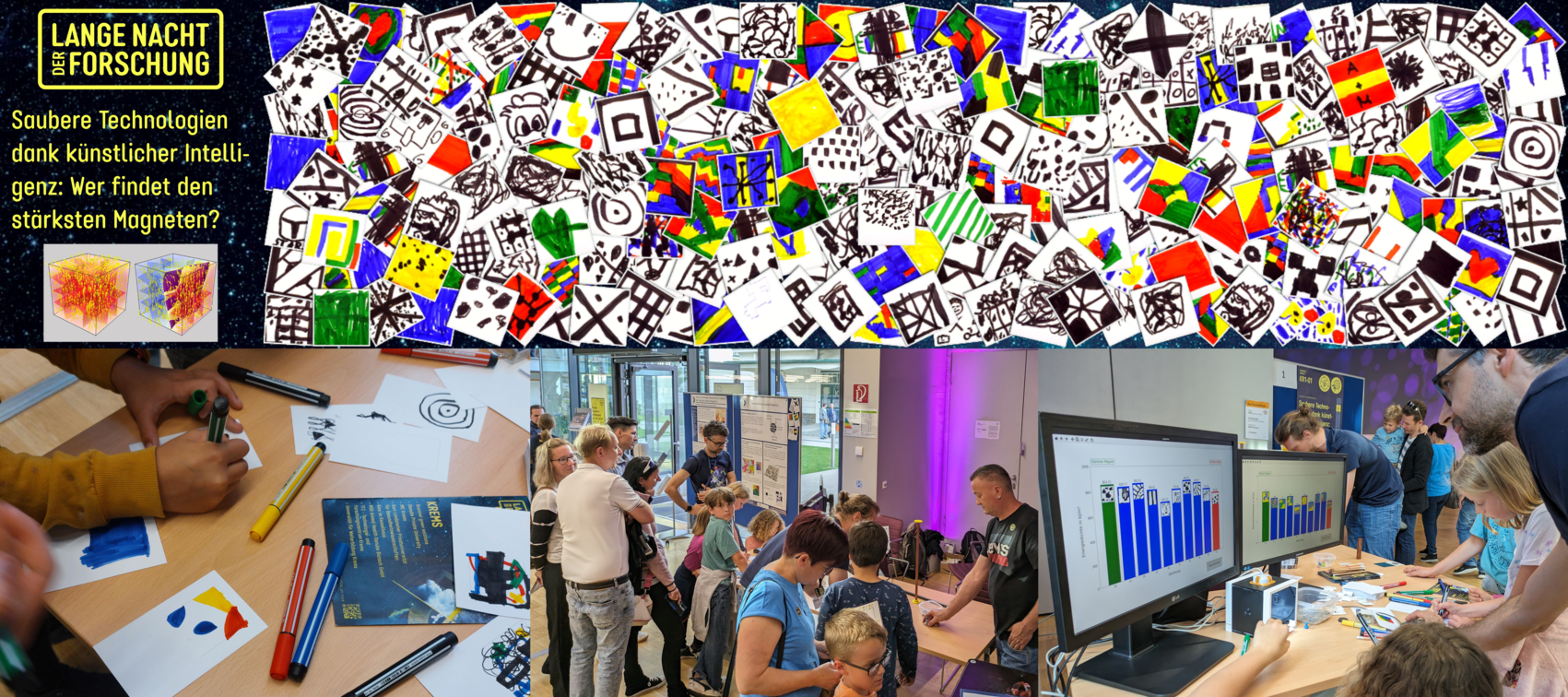
On April 17th, Lukas Exl successfully held his colloquium for his habilitation at the University of Vienna, within the Faculties of Mathematics and Physics and the MMM Research Platform. He presented his research on Numerical Methods and Machine Learning in Computational Micromagnetism, showcasing his expertise in applying advanced machine learning techniques to micromagnetic simulations.

A new article on Constraint free physics-informed machine learning for micromagnetic energy minimization was published on 10th April by Lukas Exl and Sebastian Schaffer. In their recent paper, they introduce a new method which utilizes physics-informed neural networks to minimize the Gibbs Free energy in micromagnetic simulations. Additionally, they demonstrate a framework for constructive solid geometry which uses R-functions to satisfy boundary conditions required for the stray field computation. The method was successfully tested on the NIST µMAG Standard Problem #3 and can be used to quickly compute the demagnetization process of hard magnetic materials.

From February 18th to 20th 2024, Harald Özelt participated in a workshop on “Inverse-design magnonics” organized by the Wolfgang Pauli Institute and Research Platform MMM at the University of Vienna. While the emphasis was on magnonics, the event was a great opportunity to exchange ideas and experience with machine learning, optimization and inverse design across the disciplines. Harald was invited to present his work on Inverse design of Exchange Spring Nanostructures with Convolutional Neural Networks.

On February 8th 2024, together with our partners from the MMM platform we held a meeting to discuss the current progress of the project. During the session, new ideas to improve the machine learning code by data augmentation were developed. We reviewed potential publication topics and defined the required tasks. Moreover, alternative optimization schemes using machine learning for permanent magnets were discussed. Another key point of discussion was on how to enhance the model’s ability to discover designs far outside its known design space.

On September 22nd 2023, we gave multiple workshops for school classes in the framework of the Forschungsfest Niederösterreich 2023. In the admission-free workshops called “Magnetism in Motion: Hands-on Electric Motor Workshop” students could not only learn about the role of strong magnets in electric motors and generators, but also build their own simple electric motor.

On September 13th, 2023, we kindly invite you to a IEEE Distinguished Lecture 2023 by J. Ping Liu. He is an IEEE Fellow at the University of Texas at Arlington, USA and will talk about Magnetic Hardening in Low-Dimensional Ferromagnets.

On July 17th, 2023, an interview with Harald Özelt was published on scilog, the magazine of the Austrian Science Fund FWF. The article delves into the application of artificial intelligence to optimize strong magnets for the energy transition. Harald elaborates on the team's goal to reduce reliance on rare earth elements while enhancing magnet performance for electric motors and generators. The interview highlights Harald's two projects, DeNaMML and DataMag, which explore the nanostructure of individual magnetic grains and their interactions in magnetic systems with various chemical compositions. The article garnered attention from other newspapers and platforms such as ORF, APA, Die Presse, Bild, Jungfrauzeitung, Studium.at, Salzburger Nachrichten, Nau.ch, resulting in various versions being published. The research team extends its gratitude to the Austrian Science Fund for providing a platform to showcase their research.
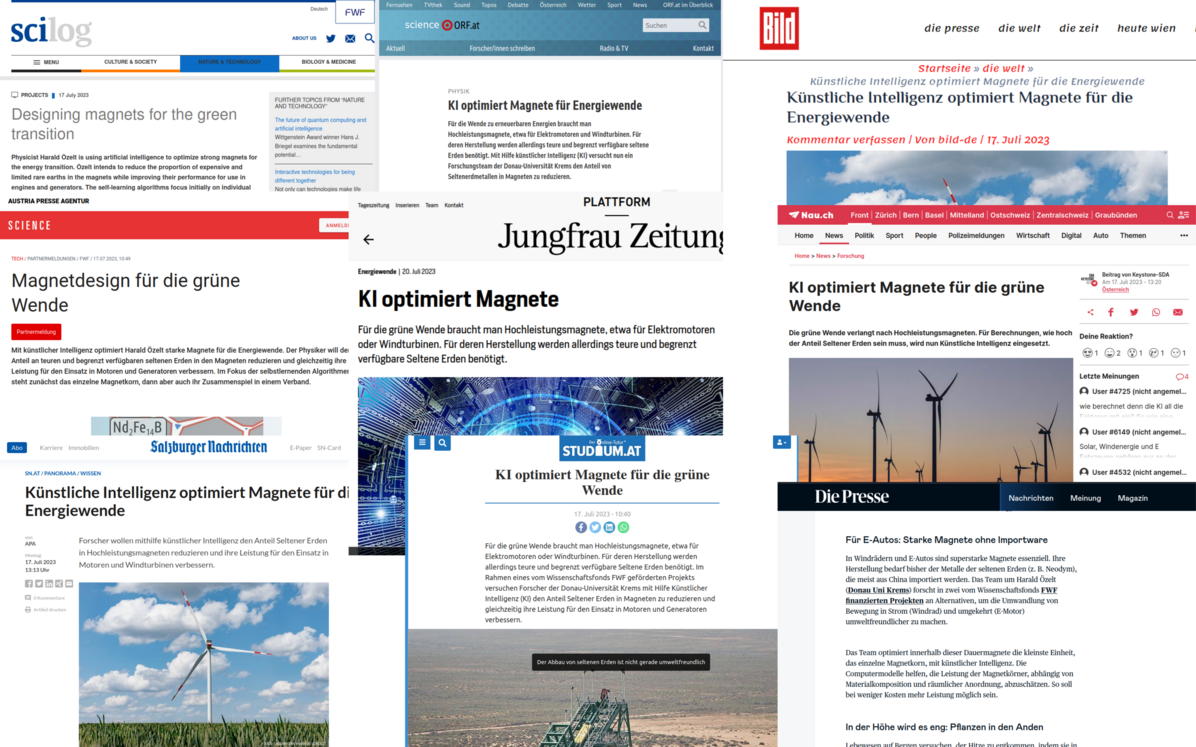
From June 19th to June 23rd, 2023, Heisam Moustafa attended the 16th Madrid UPM Machine Learning and Advanced Statistics Summer School (MLAS). He participated in the courses 'Bayesian Networks' and 'Neural Networks and Deep Learning'. Both courses aimed to deepen knowledge in these areas through theory and practical examples. This knowledge will be applied in the development of machine learning methods for magnet design.

From June 4th to June 7th, 2023, the 13th International Symposium on Hysteresis Modeling and Micromagnetics (HMM 2023) took place. Harald Özelt chaired the session on "Machine learning" and presented the current state of the project to the participants through a poster. It was explained how a Convolutional Neural Network was generated and trained with simulation data. The next step demonstrated that this model could be used in an optimization loop to find better distributions of magnetically hard and soft phases. As the project partners from the MMM Platform of University of Vienna, Lukas Exl and Sebastian Schaffer, also attended the conference, the evening hours were used for extensive project discussions.
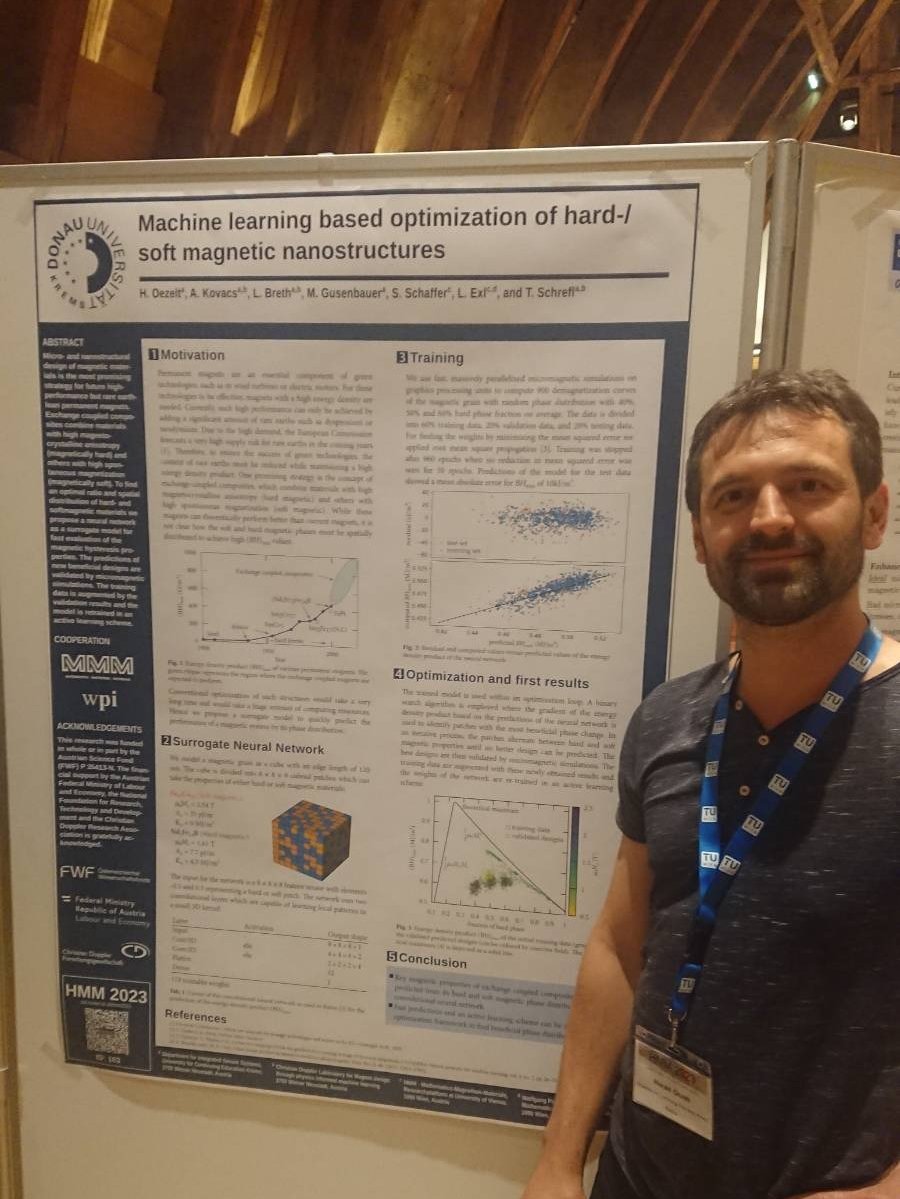
H. Oezelt, et al., "Machine learning based optimization of hard-/soft magnetic nanostructures", 13th International Symposium on Hysteresis Modeling and Micromagnetics, Vienna, Austria. Poster presentation, June 2023, doi: 10.13140/RG.2.2.17787.49445.
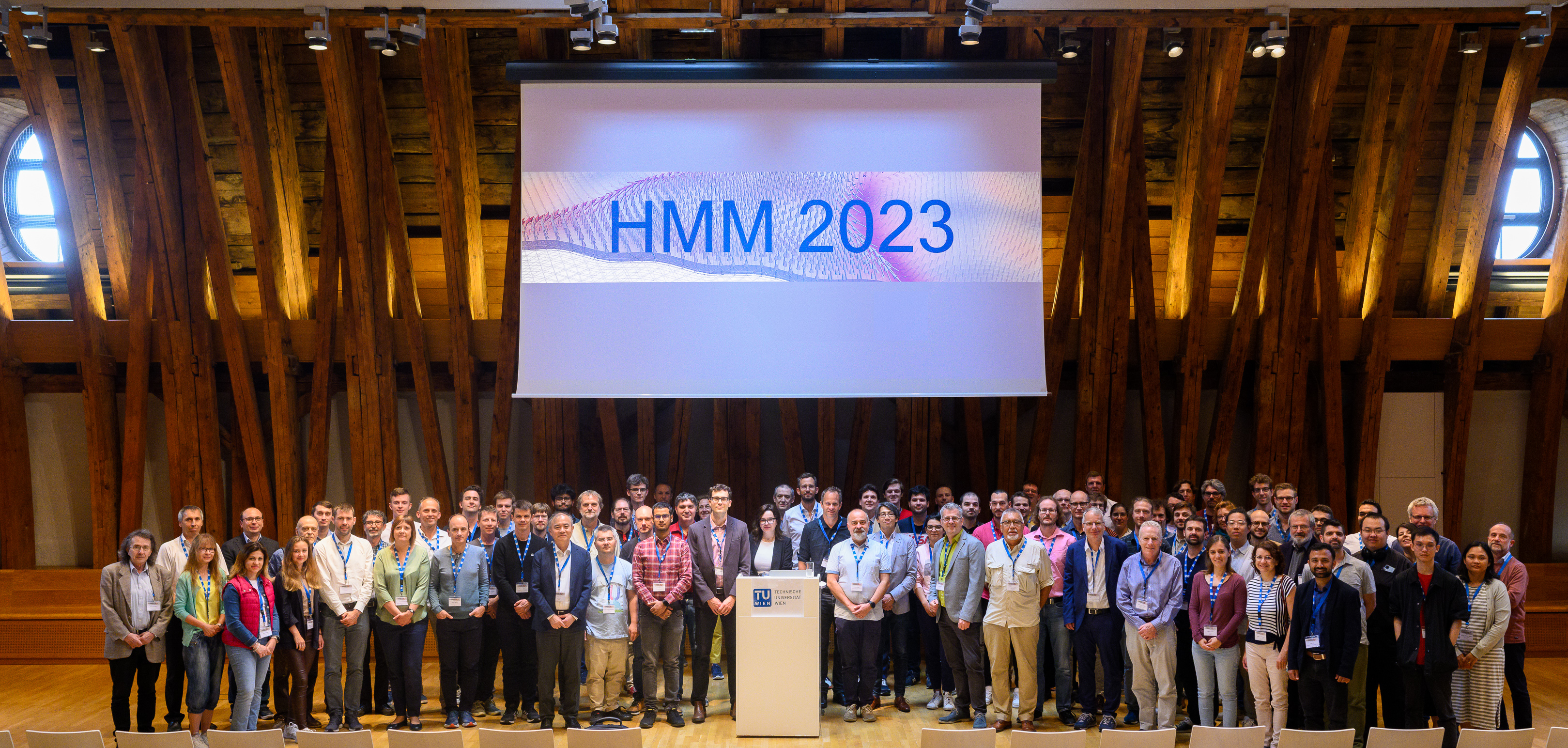
From May 15 to May 19, 2023, the IEEE International Magnetics Conference INTERMAG 2023 took place in Sendai, Japan. Under the title "Convolutional neural networks to predict properties of magnetic nanostructures," Harald Özelt presented the latest project results. In his presentation, he explained how a Convolutional Neural Network (CNN) was trained using data from micromagnetic simulations of hard and soft magnetic phase distributions. While the simulations can take several hours to calculate properties such as coercive field, remanence, or energy density product for permanent magnets with specific phase distributions, the neural network is able to predict these properties within seconds.

In mid-April 2023, Heisam Moustafa joined our center as a PhD student, focusing on micromagnetic simulations, reduced-order models, and neural networks. Prior to joining us, Heisam completed his Master of Science in Space Engineering at the University of Bremen and worked at ZARM TECHNIK AG in the field of magnetism and structural design.
In April 2023, an article was published in the Journal of Magnetism and Magnetic Materials, introducing physics-informed neural networks (PINN) for micromagnetic equations. The article explores higher-order optimization methods for training these networks. The focus was on reducing the required computational resources by providing additional physical parameters to the network through single low-parametric neural networks. The article is available as an open-access publication, allowing unrestricted access for all readers.
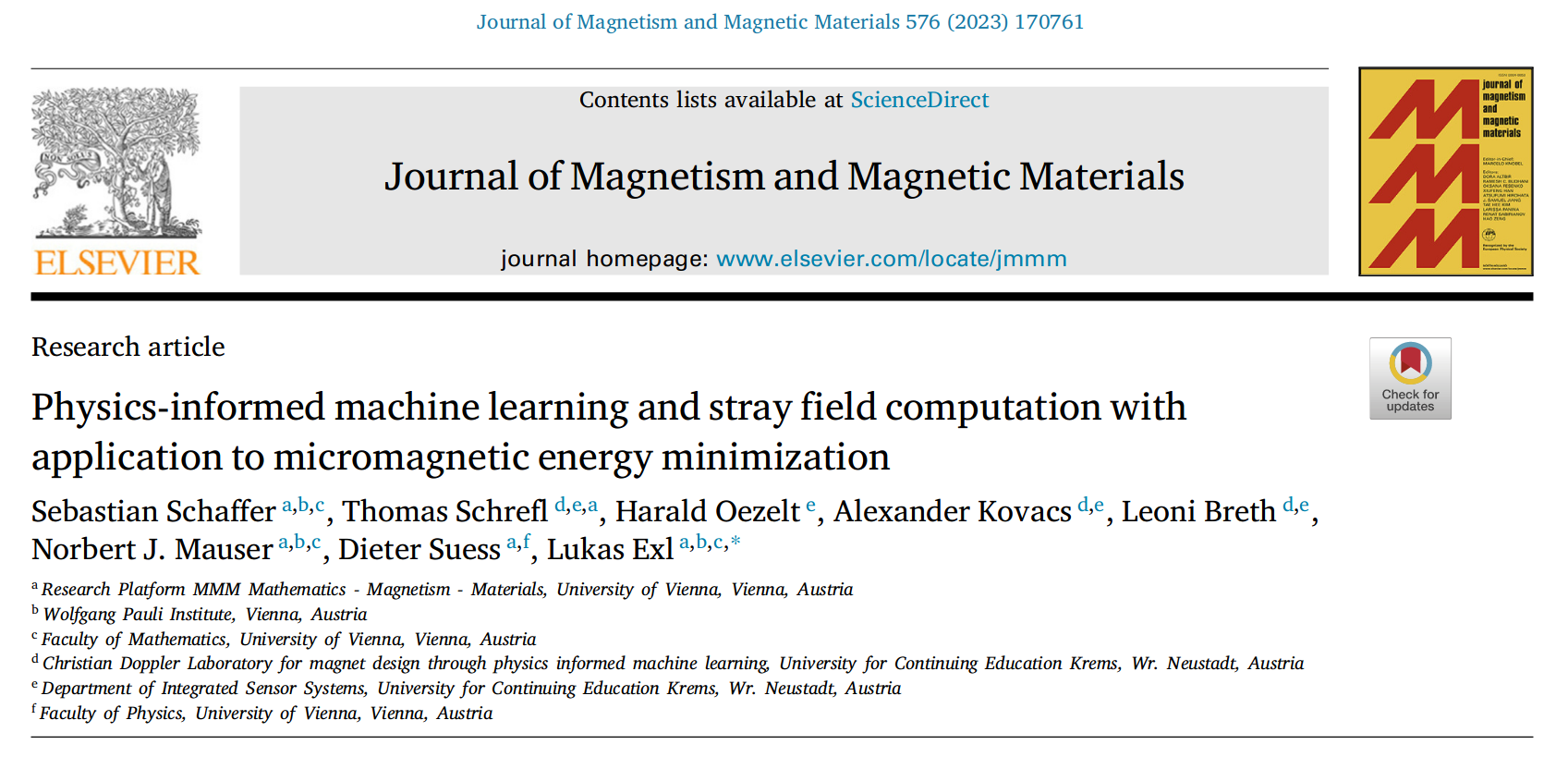
S. Schaffer et al., “Physics-informed machine learning and stray field computation with application to micromagnetic energy minimization,” Journal of Magnetism and Magnetic Materials, vol. 576, p. 170761, Jun. 2023, doi: 10.1016/j.jmmm.2023.170761.
On April 11, 2023, an article titled "Magnets for the Energy Transition" was published in the magazine for knowledge and thinking ahead by the University for Continuing Education Krems called "upgrade." In the interview, Harald Özelt talks about the importance of researching magnetic materials, as well as his career path and research routine. The article can be read in Issue 1.23 with a focus on Simulating & Measuring, starting from page 46.

On November 17, 2022, the kickoff meeting took place at the project partner's location at the University of Vienna. The participants included Lukas Exl and Sebastian Schaffer from the MMM Platform, as well as Harald Özelt and Thomas Schrefl from UWK. The initial steps for creating and exchanging training data were established. Advantageous implementations of neural networks and frameworks were discussed..
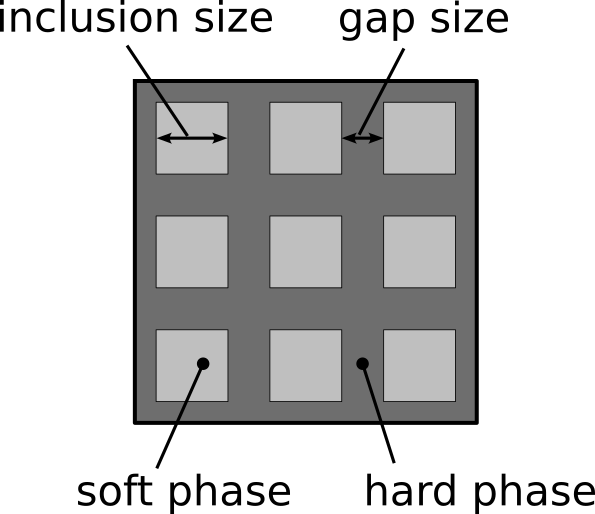
On July 13, 2022, as part of the Jungen Uni at the Krems Campus, a workshop was held for children between the ages of 10 and 13. After a lecture on permanent magnets and electric motors, the participants had the opportunity to create a simple electric motor themselves. In another short presentation, it was demonstrated how the performance of their motors could be improved through simple simulation techniques.
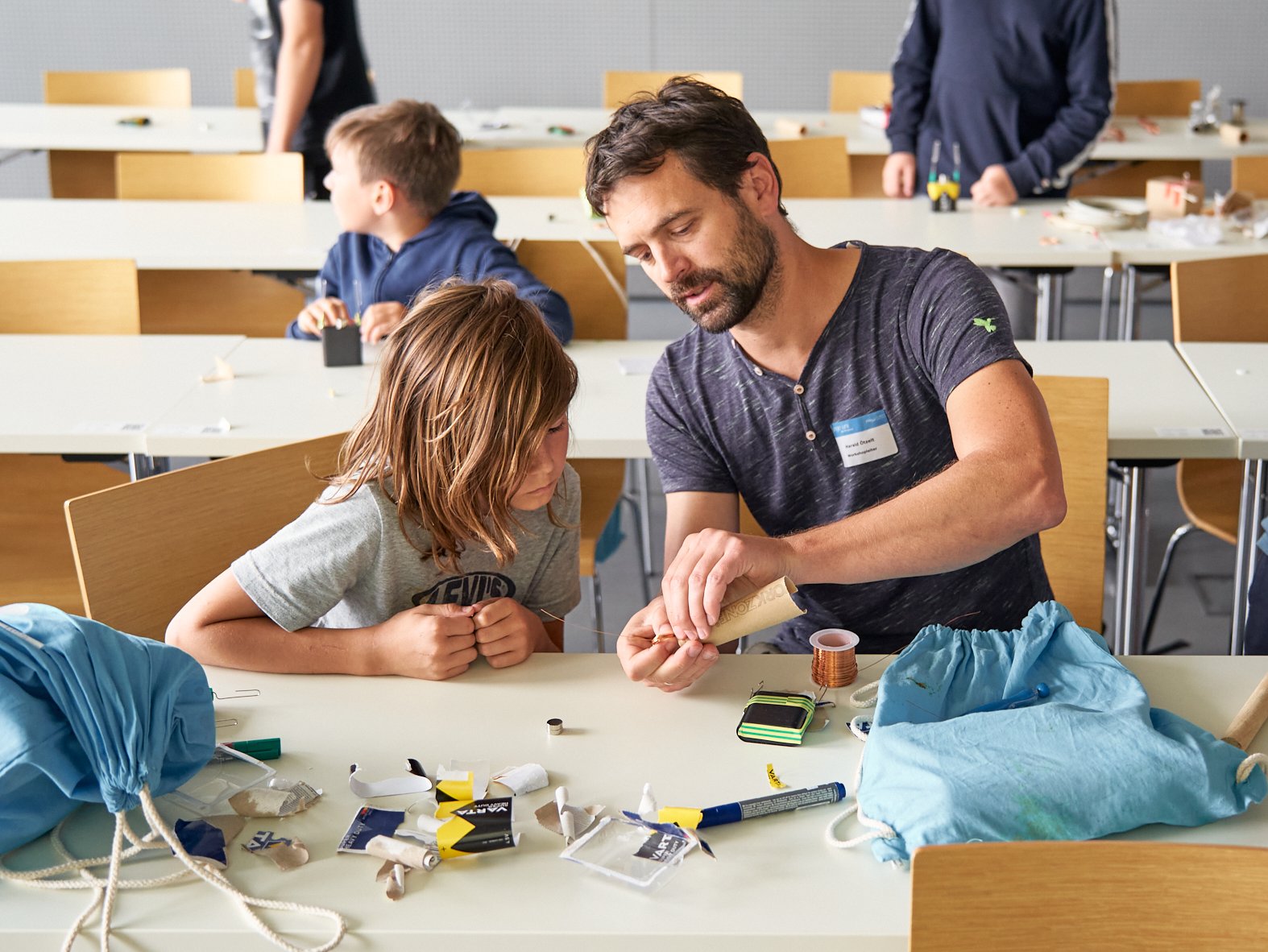
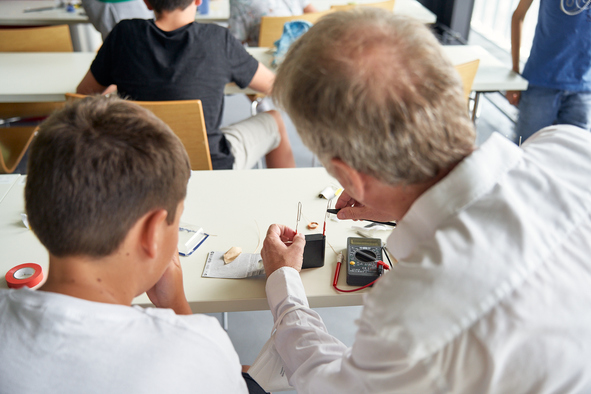
Already before the start of the project, the importance of strong permanent magnets for future green technologies and the energy transition was communicated to the public during the Langen Nacht der Forschung 2022, which took place on May 20th. At an interactive station, visitors had the opportunity to experience through simple experiments how the performance of electric motors can be influenced by powerful NdFeB magnets. The accompanying discussions and poster presentation addressed the role of critical elements and how simulation and machine learning can help reduce them.
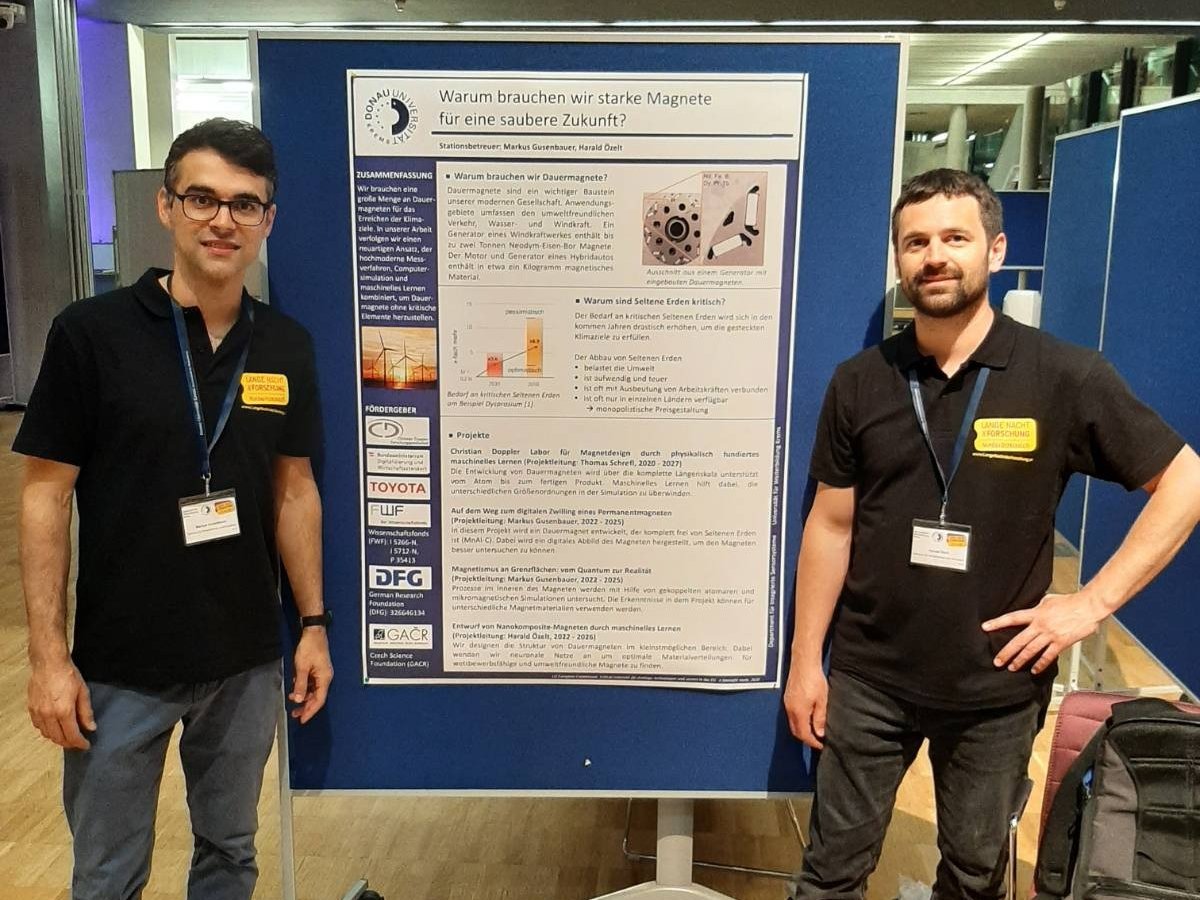
Details
| Duration | 01/11/2022 - 30/04/2027 |
|---|---|
| Funding | FWF |
| Program | |
| Department | |
| Principle investigator for the project (University for Continuing Education Krems) | Ing. Dr. Harald Özelt, MSc |
| Project members |
Team
Publications
Schaffer, S.; Schrefl, T.; Oezelt, H.; Mauser, N. J.; Exl, L. (2025). Physics aware machine learning for micromagnetic energy minimization: Recent algorithmic developments. Computer Physics Communications, Vol. 315: 1-19 (109719)
Oezelt, H.; Kovacs, A.; Breth, L.; Gusenbauer, M.; Schaffer, S.; Exl, L.; Schrefl. T. (2023). Machine learning based optimization of hard-/soft magnetic nanostructures. In: HMM, proceedings in 13th International Symposium on Hysteresis Modeling and Micromagnetics (HMM 2023): 1, HMM, Wien
Lectures
Graph Neural Networks to predict the Hysteresis Curve of Hardmagnetic Microstructures
RICAM, 27/11/2025
Graph Neural Networks to predict the Hysteresis Curve of Hardmagnetic Microstructures
TMAG 2025, 01/09/2025
Rare-Earth Lean Permanent Magnets Through Advanced Computational Design
FisMat 2025, 10/07/2025
Active Learning-Assisted Optimization of Magnetic Nanostructures
International Conference on Magnetism, ICM2024, 03/07/2024
Inverse design of Exchange Spring Nanostructures with Convolutional Neural Networks
WPI & MMM workshop on Inverse-design magnonics, 20/02/2024
Machine learning based optimization of hard-/soft magnetic nanostructures
13th International Symposium on Hysteresis Modeling and Micromagnetics (HMM 2023), 05/06/2023
Convolutional neural networks to predict properties of magnetic nanostructures
IEEE International Magnetics Conference INTERMAG 2023, 19/05/2023

